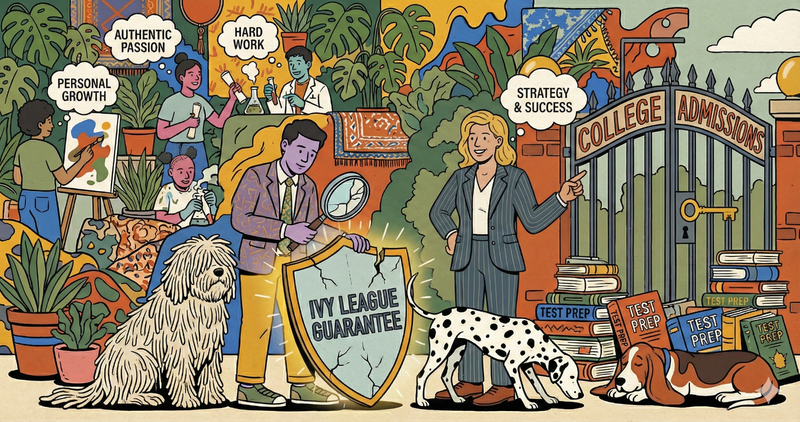

Want to study business? You need to prove you can do business.
Top colleges don’t just want kids who say they’re interested in entrepreneurship. They want students who are already thinking like founders, investors, and strategists. If you want to apply to top undergraduate business schools (like Wharton, Ross, Stern, Haas, McDonough, or Kelley) or you're building a business angle within a liberal arts degree, you have to show more than "an interest in marketing" or a DECA medal from 10th grade.
We’ll help you build a brand, launch a project, and demonstrate real-world value in a way that:
Showcases your entrepreneurial instincts
Proves you're a builder, not a bs-er
Makes you money, connections, or traction, not just a line on your resume
Top business programs want clarity, commitment, and creativity. We’ll help you figure out what kind of thinker you are (Finance-focused? Strategist? Creative marketer?) and then prove it with a project tailored to your skillset and bandwidth.
Examples of business-focused Top Dog student wins:
Launched a “rebranding” consultancy for local restaurants struggling post-COVID, with measurable client success
Created a choreography business for competitive dancers
Started an AI makeup tool that uses cosmetic chemistry to suggest the perfect mascara
These aren’t made-up Shark Tank stunts. They’re well-executed, admissions-worthy proof points that show what you're capable of.
We’ll help you identify the right undergraduate business programs, based on what they value:
Wharton: Data, leadership, impact. (Let’s make your spreadsheet smooth.)
Michigan Ross: Action-based learning. (Show you’ve already done it.)
NYU Stern: Dynamic thinkers in global markets. (We’ll get you in the room.)
Berkeley Haas: Vision-driven changemakers. (Let’s show the vision and the roadmap.)
Georgetown McDonough: Ethics meets enterprise. (Prove you’ve thought deeper than profits.)
We don’t just slap “business” on your Common App. We build a portfolio that makes colleges believe you’re the real deal.
You want to get into a top business school? Then your essays need to do what business does best: translate personal insight into strategy.
Top Dog students don’t write about their "interest in finance" or their "passion for business." They write like strategists. They pitch themselves like startups, while sounding like people, not LinkedIn bots. They land offers from Ross, Kelley, Stern, and beyond.
Our students submit essays that:
Most students write about what they want to learn. Our students write like they’ve already started learning it themselves.
One opens with an abstract economic concept (deadweight loss) and reinterprets it through emotion and dance. That’s real interdisciplinary thinking. She uses business language with emotional clarity, which is exactly what brand marketers are paid to do. Another criticizes shareholder capitalism and uses his family’s nature preserve to propose vertical farming on abandoned lots. He’s not regurgitating facts—he’s thinking like an impact investor.
Top business schools want students who understand human systems. Our essays are case studies in human systems, wrapped in a personal story.
Our students know how they think and communicate, and that is business strategy. These essays don’t describe achievements; they reveal character and clarity through narrative.
We train these students to turn personal quirks into market analysis.
One student turned lip gloss into an argument about brand intimacy and consumer psychology. She knows which alumni she wants to learn from, what she wants to ask, and how she’ll use that knowledge. Another sees a vacant lot and doesn’t just dream of community gardens. He outlines policy funding, cites dollar impacts, and name-checks Plenty, a vertical farming company backed by Jeff Bezos.
They don’t say, “I want to learn business.” They say, “I’ve already started solving real problems. I’m ready to scale.”
Each voice is distinct: dry wit, poetic confidence, gentle philosophical weirdness, and poised emotional intelligence. No essay is templated. They’re specific, grounded, and honest.
Numbers are powerful. But only if they’re used well.
We help you thread in data that supports your story without sounding like a LinkedIn post. Whether it’s “doubled a team’s efficiency” or “converted 30% of DMs into sales,” we make your accomplishments pop without killing your personality.
